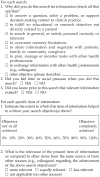Systematically assessing the situational relevance of electronic knowledge resources: a mixed methods study
- PMID: 17600105
- PMCID: PMC1975787
- DOI: 10.1197/jamia.M2203
Systematically assessing the situational relevance of electronic knowledge resources: a mixed methods study
Abstract
Electronic Knowledge Resources (EKRs) are increasingly used by physicians, but their situational relevance has not been systematically examined.
Objective: Systematically scrutinize the situational relevance of EKR-derived information items in and outside clinical settings.
Background: Physicians use EKRs to accomplish four cognitive objectives (C1-4), and three organizational objectives (O1-3): (C1) Answer questions/solve problems/support decision-making in a clinical context; (C2) fulfill educational-research objectives; (C3) search for personal interest or curiosity; (C4) overcome limits of human memory; (O1) share information with patients, families, or caregivers; (O2) exchange information with other health professionals; (O3) plan-manage-monitor tasks with other health professionals.
Methods: Longitudinal mixed methods multiple case study: Cases were 17 residents' critical searches for information, using a commercial EKR, during a 2-month block of family practice. Usage data were automatically recorded. Each "opened" item of information was linked to an impact assessment questionnaire, and 1,981 evaluations of items were documented. Interviews with residents were guided by log files, which tracked use and impact of EKR-derived information items. Thematic analysis identified 156 critical searches linked to 877 information items. For each case, qualitative data were assigned to one of the seven proposed objectives.
Results: Residents achieved their search objectives in 85.9% of cases (situational relevance). Additional sources of information were sought in 52.6% of cases. Results support the seven proposed objectives, levels of comparative relevance (less, equally, more), and levels of stimulation of learning and knowledge (individual, organizational).
Conclusion: Our method of systematic assessment may contribute to user-based evaluation of EKRs.
Figures
Similar articles
-
Seven reasons why health professionals search clinical information-retrieval technology (CIRT): toward an organizational model.J Eval Clin Pract. 2007 Feb;13(1):39-49. doi: 10.1111/j.1365-2753.2006.00646.x. J Eval Clin Pract. 2007. PMID: 17286722 Review.
-
Assessing the impact of clinical information-retrieval technology in a family practice residency.J Eval Clin Pract. 2005 Dec;11(6):576-86. doi: 10.1111/j.1365-2753.2005.00594.x. J Eval Clin Pract. 2005. PMID: 16364111
-
Cognitive impact assessment of electronic knowledge resources: a mixed methods evaluation study of a handheld prototype.AMIA Annu Symp Proc. 2006;2006:634-8. AMIA Annu Symp Proc. 2006. PMID: 17238418 Free PMC article.
-
Impact of knowledge resources linked to an electronic health record on frequency of unnecessary tests and treatments.J Contin Educ Health Prof. 2012 Spring;32(2):108-15. doi: 10.1002/chp.21133. J Contin Educ Health Prof. 2012. PMID: 22733638
-
Understanding the information needs of public health practitioners: a literature review to inform design of an interactive digital knowledge management system.J Biomed Inform. 2007 Aug;40(4):410-21. doi: 10.1016/j.jbi.2006.12.008. Epub 2007 Jan 11. J Biomed Inform. 2007. PMID: 17324632 Review.
Cited by
-
How residents and interns utilise and perceive the personal digital assistant and UpToDate.BMC Med Educ. 2008 Jul 14;8:39. doi: 10.1186/1472-6920-8-39. BMC Med Educ. 2008. PMID: 18625038 Free PMC article.
-
Impact of research-based synopses delivered as daily e-mail: a prospective observational study.J Am Med Inform Assoc. 2008 Mar-Apr;15(2):240-5. doi: 10.1197/jamia.M2563. Epub 2007 Dec 20. J Am Med Inform Assoc. 2008. PMID: 18096905 Free PMC article.
-
Barriers and facilitators to clinical information seeking: a systematic review.J Am Med Inform Assoc. 2019 Oct 1;26(10):1129-1140. doi: 10.1093/jamia/ocz065. J Am Med Inform Assoc. 2019. PMID: 31127830 Free PMC article.
-
Effectiveness of topic-specific infobuttons: a randomized controlled trial.J Am Med Inform Assoc. 2008 Nov-Dec;15(6):752-9. doi: 10.1197/jamia.M2725. Epub 2008 Aug 28. J Am Med Inform Assoc. 2008. PMID: 18755999 Free PMC article. Clinical Trial.
References
-
- Pluye P, Grad RM. How information retrieval technology may impact on physician practice: An organizational case study in family medicine J Eval Clin Pract 2004;10(3):413-430. - PubMed
-
- Schwartz K, Northrup J, Israel N, Crowell K, Lauder N, Neale AV. Use of on-line evidence-based resources at the point of care Fam Med 2003;35(4):251-256. - PubMed
Publication types
MeSH terms
LinkOut - more resources
Full Text Sources
Miscellaneous




